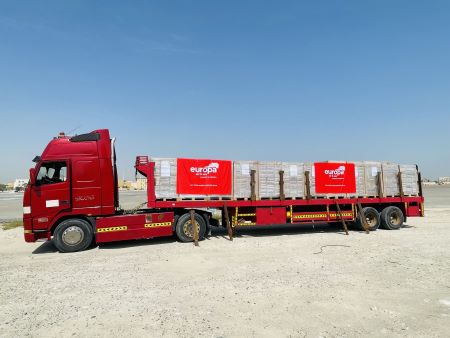International trade can involve complicated procedures and problems may arise along the supply chain. ITM Editor Joseph Clarke looks more specifically at the role of freight forwarders, and the importance of freight insurance
When transporting goods from one country to another, you will most definitely want to find a reliable freight forwarder to ensure that your shipment is smooth sailing. International trade is not a simple process and there can be complications with shipping. Fortunately, efficient freight forwarders are at hand, freeing the entire process from order to delivery from any burden.
Before entrusting a freight forwarder with your goods, you need to be completely sure that they are reliable. Make sure that they offer transparent pricing to avoid receiving a hefty bill that is way above the negotiated price. Professional freight forwarders must also be skilled and knowledgeable. Take the time to do your research on the company to ensure that they have experience and positive customer feedback. If in doubt, getting in touch with the freight forwarder and asking questions will help you to gain more insight into the history and success of the company. Qualified, trustworthy forwarders should be able to answer your questions with speed and accuracy. Additionally, they will also come up with solutions to any problems you might be facing with your shipments.
Freight forwarders
Freight forwarders, also known as forwarding agents, act as the mediator between buyers and sellers, and are responsible for delivering the goods from the seller to the buyer.
Freight forwarders work with shipping companies, airlines, and other transportation companies. The forwarding agents book space from these companies, collect your goods and provide you with a series of transportation services, such as customs clearance and arranging shipment, which greatly improves the overall efficiency of cargo transportation.
While some buyers might be tempted to bypass freight forwarders, by organising pick-up and delivery themselves, this option can be very impractical. When shipping freight, for example, you will need to have a high volume of cargo. Unless you have tens or possibly hundreds of containers to be shipped, you will find it difficult to find a shipping company to accept your order. In the case that you do indeed manage to get your cargo accepted onto a shipment, you will still need to organise other complicated matters such as delivery and insurance.
As freight forwarders are not only handling your goods, but the goods of others too, they can meet the requirements of shipping companies, saving time and money, as well as resolve any legal or bureaucratical issues that may arise along the supply chain. Furthermore, as there is a partnership between freight forwarders and shipping companies, discounted prices are often given.
Types of freight forwarding
Two main types of forwarders are available, each offering slightly different services – one being slightly more comprehensive than the other.
All-inclusive forwarders are responsible for all procedures from the seller to your destination and offer a variety of transportation methods – by land, sea and air. They also provide you with the best transportation plan to fit with the quantity and properties of your goods.
Dedicated forwarders are advantageous when shipping to particular countries as they work with forwarders or brokers who have strong customs clearance in the destination country. This makes for a smoother and shorter shipping process. Some countries like Turkey, India and Brazil are known for being stricter at customs, so using a dedicated forwarder in these cases is preferable.
Freight forwarding stages
Freight forwarding begins with export haulage. This is the very first stage in logistics, where the transportation company picks up the cargo from the seller to take to the freight forwarder’s warehouse, usually a self-owned or locally owned warehouse. This cargo is commonly transported in freight trucks; however, this may vary depending on the distance to the warehouse and the characteristics of the cargo. The time of its arrival at the warehouse is also reliant upon these factors.
The second stage is export custom clearance. Before being shipped, the international transportation of goods must be given clearance through customs. Custom agents in the country of origin check the cargo and its associated paperwork, legal documents and permission of transit before allowing it to leave the country. Freight forwarders usually rely on custom brokers to complete this stage.
Item checkpoint, also known as origin handling, takes place when the cargo is unloaded at the freight forwarder warehouse. The products are inspected for damage and the documents are verified. The freight is also checked to make sure that it meets the requirements of the destination country’s customs so that it is accepted upon arrival.
Once the shipment has arrived at its destination country, it is then re-checked to see if the products match, if there is any damage, as well as the legality of the transit. This stage is called item import customs. At this point, impose charges are implemented by the customs agent, initially covered by the freight forwarder but then billed to the customer.
The penultimate stage is destination arrival and handling. Having cleared import customs, the company that is transporting the goods, as organised by the freight forwarder, checks the paperwork of the shipment and gets the cargo ready for delivery in the import warehouse.
Import haulage is the final stage of freight logistics. This is when the cargo is prepared to be delivered at its final destination. Depending on how the cargo is now being transported, the recipient usually receives the shipment within hours or days after it has left the warehouse.
Insurance for freight forwarders
Liability and marine insurance are the two important types of cover for freight forwarders to consider. Just like any other business, forwarders must have public liability insurance; and if they have staff, they also require employer’s liability insurance.
Before choosing a company for insurance, there are a few important things to bear in mind:
- Recognise your requirements
Freight forwarders need to obtain detailed information about the shipment and their needs, before getting insurance. The insurance will vary depending on the methods of transport being used, the possible risks involved and customs.
- Go over the ‘Inclusion’ and ‘Exclusion’ list
It is essential to be aware of which terms are included in the policy. Take the time to ask your insurance provider about what is not covered and whether you can pay extra charges to get complete cover.
- How credible is the insurer?
Look for evidence that proves that the insurance company is reliable. If you have any doubts, contact the company to ask about your concerns.
Liability insurance
Any freight forwarder needs to have liability insurance cover as damage to cargo can be frequent. This can occur in many ways that you would not have predicted – mishandling, abandonment, rerouting, delays in customs, delays with paperwork can all be contributors to lost or damaged cargo. This kind of unexpected harm can be expensive for freight forwarders unless they are covered by liability insurance.
There is a wide range of brokers to choose from, although it is recommended that specialist insurance brokers are consulted in order to gain advice on the best company to select. The policies that the different brokers offer do not cover the goods themselves, with this responsibility being left to the buyer or the seller.
Typically, FFL Insurance covers:
- Loss or damage to the cargo during transit
- Custom fines and duties from errors or omissions
- Third-party liabilities (legal expenses, mitigation costs, debris removal)
- Legal protection services to tackle unjustified third-party claims
- Coverage for personal injury or employee injury during operations
- Damage repair and lost units
- Recovery and maintenance costs (full cover)
- Port authorities for any breach of regulation or duties
- Abandoned or uncollected cargo
- Financial claims from shippers and receivers
- Operational services against fire, explosion, or other natural calamities
Marine insurance
Covering the loss or damage of goods being transported internationally, marine insurance policies also cover air, road and rail transport. Marine insurance will typically cover maritime perils, such as stranding, sinking, crashes, pirates, thieves, capture, jettison and washing overboard; damage while in transit; loss or damage through road accident; loss or damage through hijacking, loss or damage through rail derailment, loss or damage through air disaster.
Owners of goods without insurance during international transportation will only be entitled to a proportion of the goods’ real value, as freight forwarders and carriers can limit their liability. Marine insurance policies are often carried by freight forwarders so that, if requested by customers, they can be added to the insurance as an extra, with an additional cost.
Difference between liability and marine insurance
The most noticeable difference between general liability policies and marine insurance is that the former may exclude any work done on the water or vessels, while the latter will cover you for any damages or liability to a third person involved in marine operations. In other words, for international trade that requires shipping, marine insurance is the more comprehensive alternative.
International trade finance
The role of freight forwarders in guaranteeing that the seller receives payment from the buyer – on time and in full – is crucial. If, for example, the payment terms are cash on delivery, the freight forwarder will make sure that this money is collected upon delivery. In other situations, the forwarder can help oversee payments by ensuring that the correct documents are filled out and sent to the right places, complying with deadlines.
Sellers and buyers are often separated by miles of land and/or sea; and the financial stability of the buyer’s location may be unknown. For this reason, international financial institutions have created specialist procedures that help exporters to carry out business safely – with the knowledge that they will be paid on time and in full.
A freight forwarder’s provision of organised and accurate documents is only possible by understanding these processes. With this understanding and compliance, the transportation of goods will be time and cost efficient.
Letters of credits
When it comes to ensuring that payment is made, one of the best-known processes is a letter of credit, also known as a documentary credit. This document provides security to both the seller and the buyer through the International Banking System.
The rules for documentary credits can be consulted in the Uniform Customs and Practice for Documentary Credits (UCP) publication, put together by the International Chamber of Commerce (ICC).
The standardisation of its terms and conditions is just one of the benefits of the UCP. The current UCP version can be purchased from the ICC and is a must read for all freight forwarders.
Freight forwarding risk management
Freight forwarders are responsible for the care and control of goods and documents from third parties. Given that these goods are often of great economic value, efficient and reliable risk management is crucial for running a successful forwarding business.
One possibility for freight forwarders is to limit their liability and cover just some of the risks with insurance policies. It can be quite simple to invalidate the benefits of limited liability through ignorance or carelessness. In addition, several risks are uninsurable. Loss caused by terrorism, for example.
Although risk can never be eliminated entirely, with good practice and training, it can be minimised to more favourable levels, reducing the possibility of unwanted claims that could seriously lower profits.
Forwarders must bring their trading conditions to the attention of customers before the contract is concluded. If they fail to do so, this could prejudice insurance cover and invalidate the protections of limited liability.
Freight forwarding is a long and complicated process with many stages and requiring the involvement and cooperation of several companies and institutions. Given the number of tasks that need to be organised and carried out without error, along with the added complications of restrictions on international shipping, which result in heavy sanctions, freight forwarders need to protect themselves as best as they can. For international trade, freight insurance is not a recommendation, but a must, in order to ensure that the freight forwarder is covered for any of the numerous glitches that can occur along the supply chain, and also to provide the most reliable, efficient and economical service to its customers.
Read more news and exclusive features in our latest issue here.
Never miss a story… Follow us on:
International Trade Magazine
@itm_magazine
@intrademagazine
Media Contact
Joseph Clarke
Editor, International Trade Magazine
Tel: +44 (0) 1622 823 920
Email: editor@intrademagazine.com







